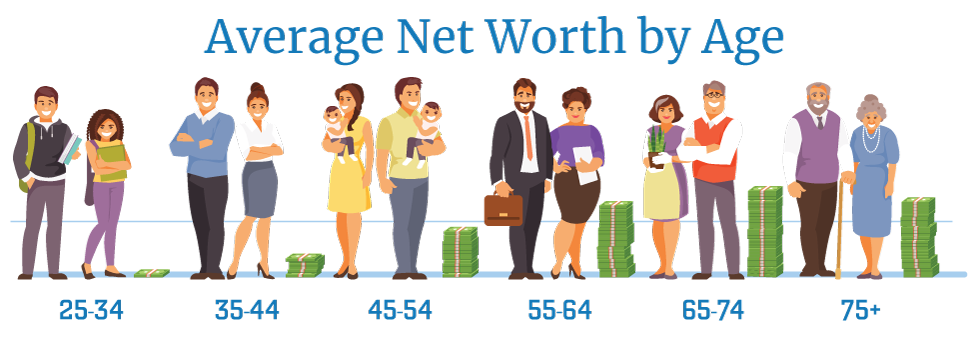Average Net Worth by Age
The average American has a net worth of $80,000. Is that enough for retirement? Read on for answers to this and other pressing questions about net worth.
Your net worth is the total amount of your assets minus your liabilities.
- Assets include savings and things like your car, home and investments.
- Liabilities are all debts you carry, including any that are deferred, such as student loans.
Put another way, your net worth means how much money (either liquid or tied up in assets) you would have left if all your debts were paid. Read on to learn how your net worth measures up.
- Average Net Worth by Age
- Distribution of Net Worth
- Average Net Worth Nationwide
- Average Net Worth by Education Level
- Average Net Worth by Ethnicity
- Average Value of Assets and Debts
- Average Income by Age
- Retirement and Net Worth
- How to Increase Net Worth
Average Net Worth vs Median Net Worth
The average and median net worth figures are vastly different. You'll see that the average net worth is a lot higher. This is because the average is skewed by the small number of high-net-worth individuals who are worth billions of dollars.
For a more realistic figure of where the average American stands, look at the median number instead. This number represents the midpoint value, where half of the people fall below that number and half of the people fall above.
Average Net Worth by Age
Here's a look at the average net worth of American families by age group. If you want an idea of where you stand, it's best to compare to others in your age group.
| Age | Average Net Worth | Median Net Worth |
|---|---|---|
| 34 and under | $76,300 | $13,900 |
| 35-44 | $436,200 | $91,300 |
| 45-54 | $833,200 | $168,600 |
| 55-64 | $1,175,900 | $212,500 |
| 65-74 | $1,217,700 | $266,400 |
| 75+ | $977,600 | $254,800 |
Age 34 and under
The average American under the age of 35 has a net worth of $76,300, according to the Federal Reserve. However, the median net worth is only $13,900, meaning that half of people under 35 have less than that and half have more.
At this age, you're most likely still establishing your career. Things like student loan debt may decrease your net worth. It's best to focus on paying off debt during this age period to set a healthy foundation for building wealth.
Age 35-44
American families between the ages of 35 and 44 have an average net worth of $436,200. The median net worth is $91,300. This is a 44% increase since the 2016 median of $63,600. This group experienced the highest net worth increase of all age groups.
This big increase in net worth could be due to many people buying houses during this age. Marriage also merge finances. During this period, you should put more focus on saving for retirement.
Age 45-54
The average net worth for Americans aged 45-54 years old jumps to $833,200. The median net worth almost doubles to $168,600, a 28% increase from the $132,100 median in 2016.
You should be saving more aggressively for retirement during this period. Financial experts recommend having 6x - 7x your annual salary saved by the time you're 55.
Age 55-64
People between the ages of 55-64 years old have an average net worth of $1,175,900. However, the median is only $212,500. This is a 7% increase from their 2016 median of $199,200.
This is the last stretch before retirement. Your earning power is most likely at its peak. Your expenses should also lower as you pay off the mortgage and your kids have grown. Experts advice to have 10x of your annual salary saved by retirement age at 65.
Age 65-74
The average person aged 65-74 has $1,217,700 in net worth. The median net worth is $266,400. This is a 12% increase from their average net worth in 2016, which was $237,600.
Age 75+
People 75 and older have a slightly lower average net worth of $977,600. Their median net worth is $254,800, a 10% decrease from their 2016 average of $281,600.
During the later years, net worth will naturally decrease as retirees start to draw their retirement savings. Keep reading for more information about retirees and net worth.
Distribution of Net Worth
Here's a look at how wealth is distributed in America, based on the income quintile percentage.
| Percentile of income | Average Net Worth | Median Net Worth |
|---|---|---|
| Bottom 20% | $114,100 | $9,800 |
| 20 - 39.9% | $136,000 | $44,000 |
| 40 - 59.9% | $220,500 | $92,900 |
| 60 - 79.9% | $423,000 | $199,100 |
| 80 - 80.9% | $850,000 | $382,300 |
| Top 10% | $4,850,100 | $1,589,300 |
From the above table, it's plain to see that the richest 10% of American households hold the majority of the wealth - with an average net worth of $4.8 million. In comparison, those in the bottom 20% only have an average net worth of $114,100, and median of just $9,800.
Average Net Worth Nationwide
| Living Situation | Average Net Worth | Median Net Worth |
|---|---|---|
| Nationwide | $748,800 | $121,700 |
| Homeowners | $1,102,100 | $255,000 |
| Renters | $95,600 | $6,300 |
| Metropolitan Area | $806,400 | $126,000 |
| Rural Area | $324,800 | $90,400 |
All Americans nationwide
American families have an average net worth of $748,800. Though it sounds high, the median net worth is just $121,700. This represents the approximate 43% of Americans who identify as "middle class."
Homeowner
The average net worth of a homeowner is $1,102,100 and the median $255,000, according to the Federal Reserve. This is 4% higher than their median of $246,200 in 2016.
Renter
For renters, the average net worth is significantly less at $95,600. The median is only $6,300, which is 18% increase over their median net worth of $5,300 in 2016.
Metropolitan area (MSAs)
The average net worth of a person living within a metropolitan area is $806,400, and the median roughly $126,000. In 2016, the median was $105,300 - that's a 20% increase over 3 years.
A metropolitan statistical area (MSA) is a high-population geographical region. MSAs are typically defined as one or more counties surrounding a large city with at least 50,000 residents. Some MSAs surround more than one large city, such as the Dallas-Fort-Worth-Arlington MSA in Texas.
Rural area
People living in rural areas have a much lower average net worth of $324,800. The median is $90,400, a 3% decrease from the $93,300 median in 2016.
AVERAGE NET WORTH BY EDUCATION LEVEL
| Education | Average Net Worth | Median Net Worth |
|---|---|---|
| No High School Diploma | $137,800 | $20,500 |
| High School Diploma | $305,200 | $74,000 |
| Did Not Finish College | $376,400 | $88,800 |
| College Degree | $1,519,900 | $308,200 |
No high school diploma
For American families whose head of household did not finish high school, the average net worth is roughly $137,800, and the median is $20,500.
High school diploma
The average high school graduate with no college experience has an average net worth of roughly $305,200, and an median of $74,000.
Did not finish college
People with some college education, but did not graduate, have an average net worth of $376,400, and an median of $88,800.
College degree
After obtaining a college degree, the average person's net worth jumps to $1,519,900, with a median of $308,200.
A person with a personal net worth of $2.3 million or more is considered wealthy, according to a Charles Schwab survey. That number is over 20 times the net worth of the average American today.
AVERAGE NET WORTH BY ETHNICITY
| Ethnicity | Average Net Worth | Median Net Worth |
|---|---|---|
| Caucasian/White | $983,400 | $188,200 |
| Hispanics | $165,500 | $36,200 |
| African-Americans | $142,500 | $24,100 |
| Other | $657,200 | $74,500 |
Caucasian/White
The average net worth of families where the head identifies as Caucasian/white is roughly $983,400. The median net worth is $188,200. This is a huge discrepancy from families that identify as other races.
Hispanics
The average net worth of Hispanic families is $165,500. This is a 19% decrease since 2016 when this racial group had an average net worth of $203,300. However, the median net worth of $36,200 is a large 65% increase from the 2016 median of $21,900.
African-Americans
The average net worth of African-American families is $142,500 (a slight decrease from the 2016 average of $146,800). But this group also saw a significant increase in the median net worth - up to $24,100 (from the $18,200 median three years ago).
Other
Families identifying as other or multiple race have an average net worth of $657,200, while the median is at $74,500.
Average Value of Assets and Debts
| Assets and Debts | Average Value | Median Value |
|---|---|---|
| All Assets | $860,300 | $227,600 |
| Financial Assets | $363,700 | $25,700 |
| Non-Financial Assets | $544,600 | $194,300 |
| All Debts | $140,600 | $64,800 |
Average value of assets
About 99.6% of Americans hold assets of some kind, with an average value of $860,300. However, the median value is only $227,600, which means half of Americans fall below this number.
The average American has about $363,700 worth in financial assets (such as savings accounts, investment accounts, retirement accounts, and life insurance cash value). The average value of non-financial assets is about $544,600 (this includes vehicles, properties, and businesses).
Average amount of debt?
About 76.6% of Americans have some sort of debt. The average debt (of any kind) is $140,600. This includes property debt, student loans, car loans, personal loans, lines of credit, and credit card balances.
Average Income by Age
While there is a somewhat of a correlation between net worth and income, it's not always true that higher income = higher net worth.
For example, a young family with student loans and mortgage may have low net worth despite good incomes. Retirees have low income, but have accumulated a high net worth through the decades.
| Age | Average Income | Median Income |
|---|---|---|
| 34 and under | $65,100 | $48,600 |
| 35-44 | $111,000 | $74,300 |
| 45-54 | $145,300 | $77,800 |
| 55-64 | $130,600 | $63,600 |
| 65-74 | $107,800 | $50,200 |
| 75+ | $74,900 | $43,100 |
Under 35
The average income of households where the head is under the age of 35 is $65,100. This represents a 9% increase from their average income of $60,000 in 2016.
Age 35-44
The average income of households where the head is 35-44 jumps to $111,000 - a 7% increase from 2016, when their average income was $103,300.
Age 45-54
The average income of households where the head is 45-54 is $145,300. This is a small 4% increase from their average of $139,800 in 2016.
Age 55-64
The average income of households where the head is 55-64 is $130,600. This age group experienced a large 13% decrease from 2016, when their average income was $150,300.
Age 65-74
The average income of households where the head is 65-74 drops to $107,800. Retirement starts to happen, so it's expected for income to drop. This income includes pensions, withdrawals from retirement accounts, and Social Security distributions.
Age 75+
The average income for households aged 75+ further drops to $74,900. This is a 9% decrease from 2013, when the average income for this age group was $82,000.
Retirees and Net Worth
Average retirement age today
The average retirement age in the U.S. is 63. More specifically, men retire at an average age of 64 and women an average age of 62. This is when people start drawing from their assets, which lowers their net worth.
How much money the average retiree needs
You should aim to have 70% of your pre-retirement income to live comfortably during retirement. The median household income today is $58,600, which means the average household should have at least $41,020 per year saved for retirement.
If you are eligible to receive Social Security, your payout amount will depend on several factors, such as birth year and retirement age. It's then up to you to supplement any social benefit payments with your own retirement savings to live comfortably.
Average retirement savings
The average American has about $96,000 saved for retirement. But among those with an annual income of $250,000 or more, the typical nest egg is substantially higher, averaging more than $450,000.
Average Social Security payment today
On average, retirees can expect a payment of $1,514 per month from Social Security.
How to Increase Net Worth
 |
| © CreditDonkey |
If you feel like you're not up to par with your peers, you don't have to freak out just yet. It's never too late to start taking steps to increase your net worth. Here are some ways you can increase net worth.
1. Reduce debt
We always recommend to make paying off debt a top priority. With high interest rates, the debt you're racking up is easily more than what you can earn in savings or investments. We recommend focusing on "bad" debt first, such as credit card debt and personal loans. With some debts off your shoulder, your net worth will instantly increase.
For long term installment debt, such as student loans and mortgages, consider refinancing to get a better rate and term.
2. Max out retirement contributions
This is one of the most important things you can do. Most employers will match 401k contributions. That's free money they're offering towards your retirement. Let's say your employer matches up to 5%. That means if you contribute 5%, then you're automatically saving 10% of your income for retirement.
If you can, open a separate tax-advantaged retirement account (like a Roth IRA) and contribute the maximum amount each year. Anything you contribute now will help increase your net worth as you get older.
3. Invest to grow your money faster
Investing will help grow your money the fastest. Your earnings compound, so even one small deposit will grow into something more over the years. There are a number of online brokerages for DIY investors and robo advisors if you prefer to be hands-off.
For shorter term goals, make your money work for you in a high yield savings account.
4. Cut down on expenses
See where you can cut down and save the difference. For example, cancel the cable package and subscribe to Netflix for $10/month instead. Cancel the gym membership and do at-home workouts on YouTube. Search for a cheaper car insurance.
Every little bit helps. If you can cut down $500 worth of expenses per month, you'll have $6,000 more after a year.
Bottom Line
The higher your net worth, the better your chances of having financial security in your retirement years. The best way to prepare is to begin saving now.
Consider your daily expenses and what you want to accomplish during retirement. Then set your goals accordingly.
Write to Kim P at feedback@creditdonkey.com. Follow us on Twitter and Facebook for our latest posts.
Note: This website is made possible through financial relationships with some of the products and services mentioned on this site. We may receive compensation if you shop through links in our content. You do not have to use our links, but you help support CreditDonkey if you do.
Empower Personal Wealth, LLC (“EPW”) compensates CREDITDONKEY INC for new leads. CREDITDONKEY INC is not an investment client of Personal Capital Advisors Corporation or Empower Advisory Group, LLC.
|
|
|











